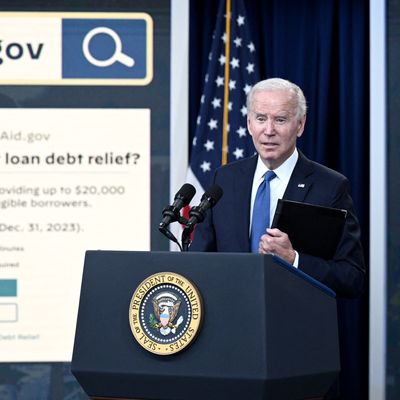
On Friday, a federal appeals court temporarily halted the Biden administration’s new student-loan forgiveness plan, which aims to cancel billions of dollars of student debt for tens of millions of Americans. The administration had been set to start discharging the debt as soon as this weekend, after nearly 22 million people applied for the debt relief in the first week the application was available — roughly half of the estimated number of Americans who are eligible for it. Under the plan, borrowers with government-held student loans who meet certain income requirements can apply for a one-time cancellation of up to $10,000 of their debt, or $20,000 if they ever received a Pell Grant.
A coalition of six Republican-led states — Arkansas, Iowa, Kansas, Missouri, Nebraska, and South Carolina — have challenged the loan-forgiveness plan in court, arguing that discharging the student debts is unconstitutional and would do them economic harm. Their lawsuit, which is one of many legal challenges by Republican lawmakers and conservative groups attempting to block the one-time debt relief, was dismissed by a Federal District Court judge in St. Louis on Thursday, who ruled the states don’t have the necessary legal standing. The states immediately appealed the ruling with the U.S. Court of Appeals for the Eighth Circuit, which on Friday granted their request for an emergency stay, thus pausing the loan-forgiveness program until the court rules on the states’ motion for a preliminary injunction.
In a statement on Friday night, the White House emphasized that the ruling was not on the merits of the case and did not prevent Americans from applying for the relief on the program website, which it encouraged eligible borrowers to continue to do. “It also does not prevent us from reviewing these applications and preparing them for transmission to loan servicers,” White House spokesperson Karine Jean-Pierre said. Education Secretary Miguel Cardona tweeted, “We are moving full speed ahead to be ready to deliver relief to borrowers.”
The Biden administration has argued that the Education Department has the authority to discharge the student debts thanks to a 2003 law granting it special powers in response to a national emergency — which in this case would be the pandemic.
In the aftermath of Friday’s stay, the executive director of the Student Debt Crisis Center, Cody Hounanian, responded that the organization was “confident that the President’s student debt cancellation plan will remain and that borrowers will receive relief in due time.” Student-loan lawyer Adam Minsky has also published a helpful guide explaining what the stay does and does not mean for borrowers (at least for now).
Earlier Friday, President Biden promoted the student-loan forgiveness program at an event at Delaware State University. He defended the plan, insisting it was both justified and affordable, and he attacked the Republican efforts to stop it, including the lawsuit by the six states. “Republican members of Congress and Republican governors are doing everything they can to deny this relief even … to their own constituents,” Biden said, adding that, “Their outrage is wrong and it’s hypocritical.”
It’s not clear how the conservative-dominated Eighth Circuit Court of Appeals will rule on the case. If it dismisses the case, the government can begin discharging the loans. If it issues an injunction, however, the pause will continue. The six-state case is considered one of the most significant legal challenges underway against the student-loan forgiveness plan, but it isn’t the only one.






























